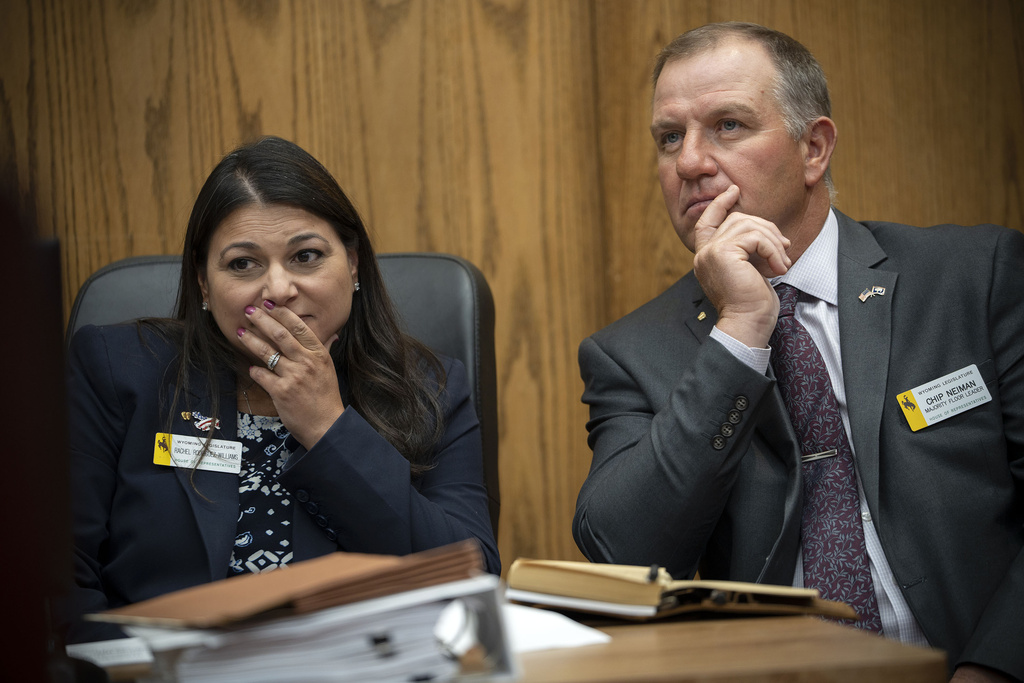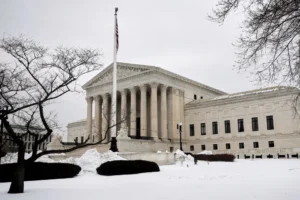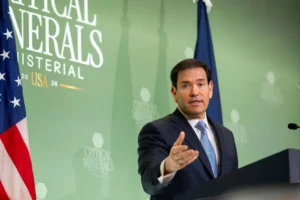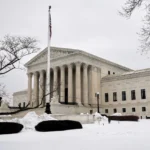Supreme Court Hearing Kicks Off Pivotal Week for Abortion Rights in Wyoming
Fate of Wyomingites’ access to abortion to be decided soon
- Published In: Politics
- Last Updated: Dec 12, 2023

Two major hearings concerning abortion rights in Wyoming are scheduled for this week, as the state of the country's first abortion medication prohibition will be decided by a Jackson judge. (AP Photo/Charlie Riedel, File)
By Jacob Gardenswartz
Special to the Wyoming Truth
The fate of abortion rights in the Equality State will come to a head this week as hearings about state laws banning the procedure are scheduled in both a district court and in the state supreme court. The outcome of those meetings could have lasting implications for the availability of pregnancy termination procedures statewide.
This morning in Cheyenne, the Wyoming Supreme Court will hear oral arguments about a matter pertaining to abortion for the first time since the U.S. Supreme Court in 2022 overturned Roe v. Wade, the landmark court case providing a constitutional right to abortion nationwide. The justices will decide whether two Republican state lawmakers and an anti-abortion group can intervene in the lawsuit against the bans, or if they should stay out of the case, as a lower court judge initially ruled.
Then on Thursday, a district court judge in Jackson will consider whether a trial concerning the legality of those bans should proceed as scheduled next spring, or if she has enough information to make the decision herself — something advocates on both sides are pushing for.

are seeking to intervene in the lawsuit and defend the legality of their abortion bans. (Bradly J. Boner/Jackson Hole News & Guide via AP, Pool)
State supreme court to weigh intervenors
In Tuesday’s hearing, justices on the Wyoming Supreme Court will weigh whether Reps. Rachel Rodriguez-Williams (R-Cody) and Chip Neiman (R-Hulett) — both of whom were intimately involved in the development of the state’s medical and chemical abortion ban laws — should be allowed to “intervene” in the abortion ban lawsuits and participate in the legal proceedings.
The lawmakers previously sought to join the case alongside Wyoming Secretary of State Chuck Gray and anti-abortion group Wyoming Right to Life. The officials argue they should be able to participate given their role crafting and enforcing the bans.
But Teton County District Court Judge Melissa Owens, who is overseeing the case, denied their request, finding that their participation could turn the courtroom into a “political foreground” and suggesting the lawmakers’ interests were already well-represented by the state officials defending the bans in court.
Nonetheless, Rodriguez-Williams, Neiman and the advocacy group appealed. Supreme court arguments in the matter are scheduled for 9 a.m. and will be broadcast live.
District court to decide whether trial is necessary
Thursday’s hearing could be far more consequential. Owens will rule on both parties’ request to skip a trial, known as motions for “summary judgment.”
Late last week, the plaintiffs earned a victory when Owens moved to allow eight experts they proposed — including medical professionals, legal officials and a religious studies scholar — to provide testimony to the court.
Defending the ban in court, Attorney General Bridgett Hill’s office had opposed such a request, suggesting the experts would be opining on “ultimate issues of law” in a way that runs afoul of court rules, but the judge disagreed.
“The trier of fact in this case has no medical training, no theological training, nor is the trier of fact permitted to rely on her knowledge as a former prosecutor,” Owens wrote of her own decision-making. As such, the experts’ testimony is necessary for her to make “determinations within each separate and distinct claim” in the case.
The judge handed the defendants a minor win by allowing a group of anti-abortion doctors to file an amicus brief in the case arguing abortion is not health care. Such filings don’t carry too much legal weight, but can provide additional context or opinions for the court to consider.
While Owens could decide the outcome of the case as early as Thursday, given the complexities involved she’s likely to take some time before issuing a written order. Regardless of the decision, individuals on both sides of the dispute say they expect the issue to be appealed to the state supreme court.
Roe fallout continues nationwide
Meanwhile, the legal and political implications of Roe’s reversal continue to reverberate throughout the country, as states implement a patchwork of different laws that can leave women seeking abortion care, as well as medical professionals providing it, unsure how to proceed.
Late last week in Texas, a district court judge approved an emergency request from a woman who is 20 weeks pregnant to halt the state’s abortion ban and terminate her pregnancy, after she learned the fetus has a fatal condition which could threaten her own health. Days later, however, the Texas Attorney General sought and the state supreme court ultimately granted an emergency stay to block her from receiving an abortion.
Though the woman has appealed that decision to the U.S. Supreme Court, her lawyers on Monday said she is opting to pursue an abortion out-of-state given her urgent need to receive the procedure.
Legal or not, the number of abortions nationwide appears to have increased since Roe was overturned, according to recent research from the Guttmacher Institute. While abortions rose in almost every state where pregnancy terminations remain legal, the increases were greatest in states bordering those that instituted bans.
According to data from the Wyoming Department of Health, the number of abortions performed in-state has increased significantly over the past four years, from 31 in 2019 to 200 in 2022, the most recent year for which there’s state-level data. Some experts have estimated the real number is far higher.
But Wyomingites seeking abortion care may soon have to travel significantly farther to receive it. On Friday, Jackson’s Women’s Health & Family Care — one of only two facilities currently providing medical abortions in Wyoming — is set to close its doors. The owners cited high rent and insurance costs as the principal reason, though some doctors there have said they intend to open another clinic next year. “Patients deserve access to safe, legal abortion care in their communities, and the loss of this provider will make it even more onerous to patients from across the region,” Julie Burkhart, a plaintiff in the abortion case and president of Wellspring Health Access, an abortion clinic in Casper that will soon become the only provider for medical abortions in the state, said in a statement. “We promise to continue to provide quality reproductive health care to patients from across the Mountain West while fighting to keep abortion legal in the state of Wyoming.”













